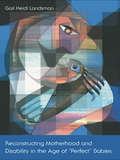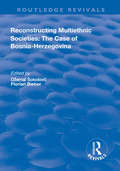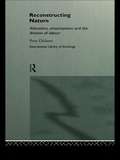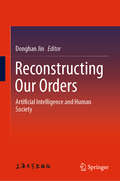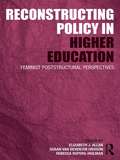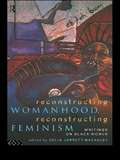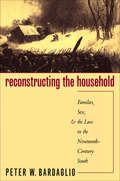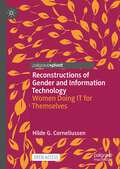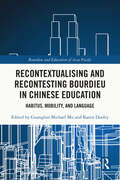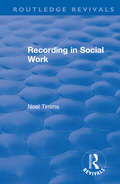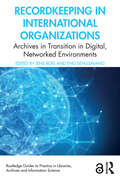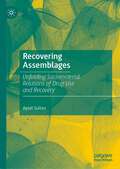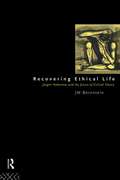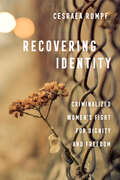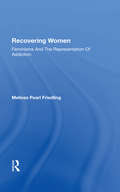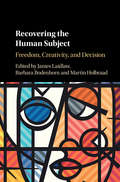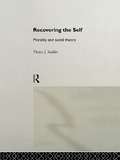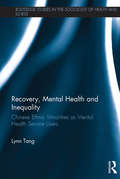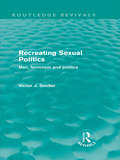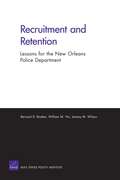- Table View
- List View
Reconstructing Motherhood and Disability in the Age of Perfect Babies
by Gail LandsmanExamining mothers of newly diagnosed disabled children within the context of new reproductive technologies and the discourse of choice, this book uses anthropology and disability studies to revise the concept of "normal" and to establish a social environment in which the expression of full lives will prevail.
Reconstructing Multiethnic Societies: The Case of Bosni-Herzegovina (Routledge Revivals)
by Florian Bieber Džemal SokolovićThis title was first published in 2001. A range of views on the challenges of the social, political, legal and psychological reconstruction of bosnian society are presented in this volume. It draws on the knowledge and experiences of scholars and practitioners from Bosnia-Herzegovina and internationally, and presents an analysis of the Bosnian case as an example for the study of other mulit-ethnic societies emerging from war. By combining a theoretical analysis of multi-ethnic societies with practical examples, the book hopes to highlight the complexities and sensitivities of a political system in a multi-ethnic state, especially in a post-war setting.
Reconstructing Nature: Alienation, Emancipation and the Division of Labour (International Library of Sociology)
by Peter DickensOne of the main features of the contemporary environmental crisis is that no one has a clear idea of what is going on. The author uses an extension of Marx's theory of alienation to explain why people find it so difficult to relate their different knowledges of the natural and social world. He argues that nevertheless it is possible to relate these to the abstractions of ecological discourse. Emancipation can come only through embracing science and rationality rather than rejecting them and, in the process, humanity as well as the non-human world will benefit.
Reconstructing Our Orders: Artificial Intelligence and Human Society
by Donghan JinThis book discusses in detail the great historical and social significance of the development of Artificial Intelligence (AI). It consists of seven chapters, each focusing on a specific issue related to AI, such as ethical principles, legal regulations, education, employment and security. Adopting a multidisciplinary approach, it appeals to wide readership, ranging from experts and government officials to the general public.
Reconstructing Policy in Higher Education: Feminist Poststructural Perspectives
by Elizabeth J. Allan Susan Iverson Rebecca Ropers-HuilmanReconstructing Policy in Higher Education highlights the work of accomplished and award-winning scholars and provides concrete examples of how feminist poststructuralism effectively informs research methods and can serve as a vital tool for policy makers, analysts, and practitioners. The research examines a range of topics of interest to scholars and professionals including: purposes of Higher Education, administrative leadership, athletics, diversity, student activism, social class, the history of women in postsecondary institutions, and quality and science in the globalized university. Students enrolled in Higher Education and Educational Policy programs will find this book offers them tools for thinking differently about policy analysis and educational practice. Higher Education faculty, managers, deans, presidents, and policy makers will find this book contributes significantly to their own policy analysis, practice, and discourse. Elizabeth J. Allan is an Associate Professor of Higher Education at the University of Maine where she is also an affiliated faculty member with the Women’s Studies program. Susan V. Iverson is an Assistant Professor of Higher Education Administration & Student Personnel at Kent State University where she is also an affiliated faculty member with the Women’s Studies Program. Rebecca Ropers-Huilman is a Professor of Higher Education at the University of Minnesota.
Reconstructing Sociology
by Douglas V. PorporaCritical realism is a philosophy of science that positions itself against the major alternative philosophies underlying contemporary sociology. This book offers a general critique of sociology, particularly sociology in the United States, from a critical realist perspective. It also acts as an introduction to critical realism for students and scholars of sociology. Written in a lively, accessible style, Douglas V. Porpora argues that sociology currently operates with deficient accounts of truth, culture, structure, agency, and causality that are all better served by a critical realist perspective. This approach argues against the alternative sociological perspectives, in particular the dominant positivism which privileges statistical techniques and experimental design over ethnographic and historical approaches. However, the book also compares critical realism favourably with a range of other approaches, including poststructuralism, pragmatism, interpretivism, practice theory, and relational sociology. Numerous sociological examples are included, and each chapter addresses well-known and current work in sociology.
Reconstructing Theatre Architecture: The Developing Process of the Modern Space for the Show (The Urban Book Series)
by Susanna ClementeThe study is aimed at reconstructing the historical process at the base of any significant theatre architecture. The modern space for the show is no longer intended as a direct derivation from classical types, but as a product of the transformation of the urban fabric in our cities. The research was conducted at the academies, state and municipal historical archives of numerous towns, in particular Rome, Milan, Mantua, Ferrara, Venice, London and Prague. All images are original. The work also includes the list of about 700 major Italian historical theatres.
Reconstructing Womanhood, Reconstructing Feminism: Writings on Black Women
by Delia Jarrett-MacauleyReconstructing Womanhood, Reconstructing Feminism is the first British feminist anthology to examine concepts of womanhood and feminism within the context of `race' and ethnicity. Challenging contemporary feminist theory, the book highlights ways in which constructions of womanhood have traditionally excluded black women's experience, and proposes a reconsideration of terms such as `feminist'. The research subjects and methods of many of the contributors have been shaped by the specifics of the Black British experience and context. The collection brings together various ideas about `difference' and identity. It covers a wide range of social and cultural issues including the position of black women in the church, lesbian identity in film, contemporary African feminism, and British immigration law.
Reconstructing the Household
by Peter W. BardaglioIn Reconstructing the Household, Peter Bardaglio examines the connections between race, gender, sexuality, and the law in the nineteenth-century South. He focuses on miscegenation, rape, incest, child custody, and adoption laws to show how southerners struggled with the conflicts and stresses that surfaced within their own households and in the larger society during the Civil War era. Based on literary as well as legal sources, Bardaglio's analysis reveals how legal contests involving African Americans, women, children, and the poor led to a rethinking of families, sexuality, and the social order. Before the Civil War, a distinctive variation of republicanism, based primarily on hierarchy and dependence, characterized southern domestic relations. This organic ideal of the household and its power structure differed significantly from domestic law in the North, which tended to emphasize individual rights and contractual obligations. The defeat of the Confederacy, emancipation, and economic change transformed family law and the governance of sexuality in the South and allowed an unprecedented intrusion of the state into private life. But Bardaglio argues that despite these profound social changes, a preoccupation with traditional notions of gender and race continued to shape southern legal attitudes.
Reconstructions of Gender and Information Technology: Women Doing IT for Themselves
by Hilde G. CorneliussenThis open access book explores what makes women decide to pursue a career in male-dominated fields such as information technology (IT). It reveals how women experience gendered stereotypes but also how they bypass, negotiate, and challenge such stereotypes, reconstructing gender-technology relations in the process. Using the example of Norway to illuminate this challenge in Western countries, the book includes a discussion of the “gender equality paradox”, where gender equality exists in parallel with gender segregation in fields such as IT. The discussion illustrates how the norm of gender equality in some cases hinders rather than promotes efforts to increase women’s participation in technology-related roles.
Recontextualising and Recontesting Bourdieu in Chinese Education: Habitus, Mobility and Language (Bourdieu and Education of Asia Pacific)
by Guanglun Michael Mu Karen DooleyFor more than 40 years, researchers have explored the utility of Bourdieu’s sociology for settings beyond the French and Algerian contexts of its origin. This edited collection has a focus on China, applying Bourdieu’s analysis of practice as Chinese education gains relevance and attention around the globe. Grounded in empirical research, Recontextualising and Recontesting Bourdieu in Chinese Education advances Bourdieu’s analysis of practice beyond national scales while producing new knowledge about the generation of habitus, mobilities, and languages in relation to Chinese education. Locating Chinese education within national and transnational contexts, this collection grapples with the structural invariances and inequivalences between Chinese education and society on the one hand, and social spaces in other parts of the world on the other hand. Through chapters that examine social mobility in the context of cross-border movement and delve into questions of language and power, this book recontests and problematises the use of Bourdieu’s sociology to theorise social classification and differentiation in China. This book is essential reading for Chinese educational researchers and practitioners, Bourdieusian scholars with particular interests in education, and sociologists of education broadly.
Recording Skills in Safeguarding Adults
by Jacki Pritchard Simon LeslieRecording Skills in Safeguarding Adults is the comprehensive guide to keeping accurate, effective and complete records in safeguarding adults work. This book explains why good record-keeping is essential: it covers crucial skills in recording, including how to write effectively; evidential requirements when writing statements and reports for court; and minute-taking. The book includes best practice points, exercises and examples of good recording. Each chapter also features informative, anecdotal experiences and comments from experts in safeguarding adults work, including police and lawyers, on what is needed in written records and how to present evidence clearly and persuasively. This book is essential reading for all safeguarding adults practitioners who are required to keep records, including social workers, probation officers, nurses, support workers, residential and day care staff, volunteers and advocates.
Recording in Social Work (Routledge Revivals: Noel Timms)
by Noel TimmsOriginally published in 1972 Recording in Social Work looks at how recording has always been claimed as one of the necessary activities of social workers, whatever form of social work they undertake. The book deals systematically with recording, and the theory and practice recording takes, as well as the research projects and small-scale studies which discuss critically certain aspects of the method. The book offers a review of the history of recording, including a critical discussion of the three early texts on the subject. It surveys the literature on purposes of recording and concludes with an analysis of the main issues surrounding recording. The book assesses the present position of theory and practice in social work recording and suggests both ways in which the subject can be developed and the wider context.
Recordkeeping in International Organizations: Archives in Transition in Digital, Networked Environments (Routledge Guides to Practice in Libraries, Archives and Information Science)
by Jens Boel Eng SengsavangRecordkeeping in International Organizations offers an important treatment of international organizations from a recordkeeping perspective, while also illustrating how recordkeeping can play a vital role in our efforts to improve global social conditions.Demonstrating that organizations have both a responsibility and an incentive to effectively manage their records in order to make informed decisions, remain accountable to stakeholders, and preserve institutional history, the book offers practical insights and critical reflections on the effective management, protection, and archiving of records. Through policy advice, surveys, mind mapping, case studies, and strategic reflections, the book provides guidance in the areas of archives, records, and information management for the future. Among the topics addressed are educational requirements for recordkeeping professionals, communication policies, data protection and privacy, cloud computing, classification and declassification policies, artificial intelligence, risk management, enterprise architecture, and the concepts of extraterritoriality and inviolability of archives. The book also offers perspectives on how digital recordkeeping can support the UN’s 2030 Agenda for Sustainable Development, and the accompanying Sustainable Development Goals (SDGs).Recordkeeping in International Organizations will be essential reading for records and archives professionals, information technology, legal, security, management, and leadership staff, including chief information officers. The book should also be of interest to students and scholars engaged in the study of records, archives, and information management, information technology, information security, and law.Chapters 7 and 9 of this book are freely available as a downloadable Open Access PDF at http://www.taylorfrancis.com under a Attribution-NonCommercial-ShareAlike (CC-BY-NC-SA) 4.0 license
Recordkeeping in International Organizations: Archives in Transition in Digital, Networked Environments (Routledge Guides to Practice in Libraries, Archives and Information Science)
by Jens Boel and Eng SengsavangRecordkeeping in International Organizations offers an important treatment of international organizations from a recordkeeping perspective, while also illustrating how recordkeeping can play a vital role in our efforts to improve global social conditions. Demonstrating that organizations have both a responsibility and an incentive to effectively manage their records in order to make informed decisions, remain accountable to stakeholders, and preserve institutional history, the book offers practical insights and critical reflections on the effective management, protection, and archiving of records. Through policy advice, surveys, mind mapping, case studies, and strategic reflections, the book provides guidance in the areas of archives, records, and information management for the future. Among the topics addressed are educational requirements for recordkeeping professionals, communication policies, data protection and privacy, cloud computing, classification and declassification policies, artificial intelligence, risk management, enterprise architecture, and the concepts of extraterritoriality and inviolability of archives. The book also offers perspectives on how digital recordkeeping can support the UN’s 2030 Agenda for Sustainable Development, and the accompanying Sustainable Development Goals (SDGs). Recordkeeping in International Organizations will be essential reading for records and archives professionals, information technology, legal, security, management, and leadership staff, including chief information officers. The book should also be of interest to students and scholars engaged in the study of records, archives, and information management, information technology, information security, and law.
Recovering Assemblages: Unfolding Sociomaterial Relations of Drug Use and Recovery
by Aysel SultanRecovering Assemblages offers an exciting new insight into the policies and practices of recovery and drug use bridging critical drug studies and the sociology of health and illness. The book investigates lived experiences of young people in Azerbaijan and Germany during their personal recovery from alcohol and other drug use and shows the contingency of 'real' experiences. The sociomaterial and ontological analyses unfold the interrelation of practices, spaces, bodies, and affects in experiencing recovery both within and outside of various treatment facilities. The book will appeal to a range of scholars, postgraduates, and undergraduates engaged in critical, methodological, and empirical studies of recovery, drug use, and policy.
Recovering Ethical Life: Jurgen Habermas and the Future of Critical Theory
by Jay. M BernsteinReading across the whole range of Habermas' work, this book traces the development of the theory of communicative reason from its inception to its defence against postmodernism. Bernstein's analyses are always problem centred and thematic rather than textual, making this a major contribution to the critical literature on Habermas.
Recovering Identity: Criminalized Women's Fight for Dignity and Freedom
by Cesraéa RumpfA free ebook version of this title is available through Luminos, University of California Press's Open Access publishing program. Visit www.luminosoa.org to learn more.Recovering Identity examines a critical tension in criminalized women's identity work. Through in-depth qualitative and photo-elicitation interviews, Cesraéa Rumpf shows how formerly incarcerated women engaged recovery and faith-based discourses to craft rehabilitated identities, defined in opposition to past identities as "criminal-addicts." While these discourses made it possible for women to carve out spaces of personal protection, growth, and joy, they also promoted individualistic understandings of criminalization and the violence and dehumanization that followed. Honoring criminalized women's stories of personal transformation, Rumpf nevertheless strongly critiques institutions' promotion of narratives that impose lifelong moral judgment while detracting attention from the structural forces of racism, sexism, and poverty that contribute to women's vulnerability to violence.
Recovering Women: Feminisms And The Representation Of Addiction
by Melissa FriedlingThis book is dedicated to the memories of Robert Branham, my professor at Bates College, whose teaching, scholarship, and humanity continue to inspire and sustain me, and to my grandma, Dorothy Grosser, whose beauty, spirit, and love are with me all the time. I would also like to thank Leighton Pierce, Franklin Miller, Michael McGee, Lauren Rabinowitz, Doris Witt, Camille Seaman, and Bruce Gronbeck at the University of Iowa for their wisdom, guidance, generosity, and support. I am especially grateful to Barbara Biesecker, my teacher, colleague, and friend, who offered perceptive comments on the manuscript and unfailing encouragement. My appreciation also goes out to the University of Iowa Graduate College, which assisted me with the award of a Seashore Dissertation Year Fellowship. At Syracuse University, I am indebted to Jane Marsching, Doug Dubois, Mark Durant, Jude Lewis, John Orentlicher, Loren Schwerd, and Owen Shapiro for their art, friendship, and constructive advice. Additional thanks go to John Sloop, and Catherine Murphy, Lisa Wigutoff, and Myia Williams at Westview Press.
Recovering the Human Subject: Freedom, Creativity and Decision
by James Laidlaw Martin Holbraad Barbara BodenhornThis volume responds to the often-proclaimed 'death of the subject' in post-structuralist theorizing, and to calls from across the social sciences for 'post-humanist' alternatives to liberal humanism in a distinctively anthropological manner. It asks: can we use the intellectual resources developed in those approaches and debates to reconstruct a new account of how individual human subjects are contingently put together in diverse historical and ethnographic contexts? Anthropologists know that the people they work with think in terms of particular, distinctive, individual human personalities, and that in times of change and crisis these individuals matter crucially to how things turn out. The volume features a classic essay by Caroline Humphrey, 'Reassembling individual subjects', that provides a focus for the debate, and it brings together a distinguished collection of essays, which exhibit a range of theoretical approaches and rich and varied ethnography.
Recovering the Self: Morality and Social Theory
by Victor Jeleniewski SeidlerThis important book seeks to place questions of morality and justice at the heart of social theory. By exploring the works of Marx, Durkheim and Weber it shows the hidden complexities of a modernity too often identified with a unified vision of the rational self later to fall apart into fragments within postmodernity. Reinstating the body and emotional life, Seidler sets new terms for respect and equality showing ways the self is undermined in its sense of self-worth and adequacy through the workings of relationships of power and subordination. Drawing upon feminism and Critical Theory to question the allegedly straightforward opposition between "essentialism" and "social constructionism" Seidler places the issues of morality right into the centre of "the self problem". Through reinstating connections between the self and the historical adventures of socialism, feminism, masculinity, ethnicity, and - autobiographically - Jewish identity, he shows the intimate affinity between these different categories of experience. Identities are not "freely chosen" but involve a coming to terms with histories of class, race and gender. Critical of postmodern theories in which anyhting goes and in which everything you see is relative, this book is concerned with the reassertion of value and recovering a viable tradition in which we can again explore issues of freedom and social justice. Our discussions have turned increasingly esoteric as they have sheltered in an intellectual cage which has been difficult to enter. This book seeks to open-up the cage and re-establish the suspended conversation between social theory and the concerns of everyday life.
Recovery, Mental Health and Inequality: Chinese Ethnic Minorities as Mental Health Service Users
by Lynn TangMental health has long been perceived as a taboo subject in the UK, so much so that mental health services have been marginalised within health and social care. There is even more serious neglect of the specific issues faced by different ethnic minorities. This book uses the rich narratives of the recovery journeys of Chinese mental health service users in the UK – a perceived ‘hard-to-reach group’ and largely invisible in mental health literature – to illustrate the myriad ways that social inequalities such as class, ethnicity and gender contribute to service users' distress and mental ill-health, as well as shape their subsequent recovery journeys. Recovery, Mental Health and Inequality contributes to the debate about the implementation of ‘recovery approach’ in mental health services and demonstrates the importance of tackling structural inequalities in facilitating meaningful recovery. This timely book would benefit practitioners and students in various fields, such as nurses, social workers and mental health postgraduate trainees.
Recreating Sexual Politics: Men, Feminism and Politics (Routledge Revivals)
by Victor SeidlerThis thought-provoking book, first published in 1991, examines sexual politics in a world which is being radically changed by the challenges of feminism. Seidler explores how men have responded to feminism, and the contradictory feelings men have towards dominant forms of masculinity. Seidler’s stimulating and original analysis of social and political theory connects personally to everyday issues in people’s lives. It reflects the growing importance of sexual and personal politics within contemporary politics and culture, and demonstrates clearly the challenge that feminism brings to our inherited forms of morality, politics and sexuality.
Recruiting in Kulturbetrieben – Leitfaden für die erfolgreiche Personalgewinnung: Praxis Kulturmanagement (essentials)
by Andrea Hausmann Olivia BraunDieses essential vermittelt kompakt und praxisnah, wie eine ganzheitliche und zeitgemäße Personalgewinnung in Kulturbetrieben erfolgreich gelingen kann. Skizziert werden dabei zum einen die unterschiedlichen Phasen des Recruitingprozesses – vom Employer Branding und der Personalbedarfsplanung über die Ausschreibung und Auswahl bis hin zum Onboarding. Zum anderen beschäftigen sich die Autorinnen kenntnisreich und praxisnah mit den verschiedenen Instrumenten des internen und externen Recruiting, wobei ein besonderes Augenmerk auf das E-Recruiting gelegt wird. Die Ausführungen werden durch Überlegungen zum Bewerbermanagement ergänzt. Hierbei wird diskutiert, welche wichtigen Kontaktpunkte es für Kandidat*innen während des Bewerbungsprozesses gibt und wie Kulturbetriebe diese professionell gestalten können.
Recruitment and Retention
by Bernard D. Rostker Jeremy M. Wilson William M. HixThis study presents recommendations to improve recruiting and retention in the New Orleans Police Department (NOPD). The recommendations, tailored to the unique circumstances of the NOPD, include using civilian employees for some jobs now performed by officers; developing a proactive recruiting program; providing housing; increasing the frequency of promotion examinations; eliminating the backlog of promotions; restructuring compensation; establishing a first-responders charter school; and rebuilding the police infrastructure.
